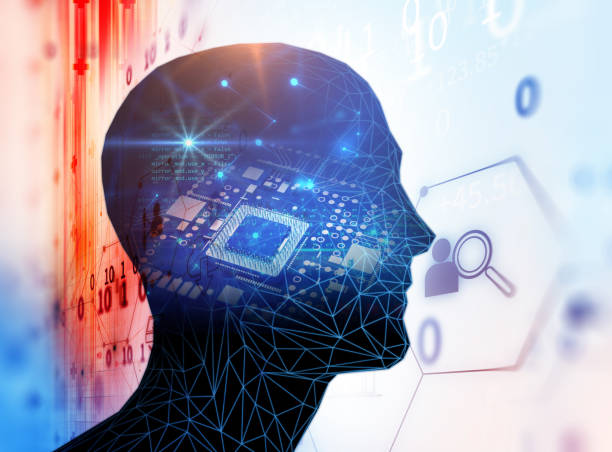What is Artificial Intelligence? Definitions and Basic Concepts

Artificial Intelligence (AI) is a branch of computer science that deals with building machines and systems capable of performing tasks that usually require human intelligence.
These tasks include learning, reasoning, problem-solving, natural language understanding, pattern recognition, and decision-making.
Artificial intelligence seeks to automate and improve system performance by simulating human cognitive processes in machines.
For example, recommender systems used in online stores and social networks use artificial intelligence to analyze user behavior and provide relevant suggestions.
#MachineLearning #NaturalLanguageProcessing #NeuralNetwork
This field is rapidly advancing and has widespread applications in various industries, including medicine, automotive, finance, and education.
The fundamental difference between artificial intelligence and traditional programming is that in artificial intelligence, machines are able to learn from data and improve their performance without explicit programming.
In other words, artificial intelligence tries to enable machines to perform tasks that require understanding, analysis, and decision-making, similar to what humans do.
Did you know that 94% of users’ first impression of a business is related to its website design? With professional corporate website design by **Rasaweb**, turn this first impression into an opportunity for growth.
✅ Attract more customers and increase sales
✅ Create credibility and trust in the eyes of the audience⚡ Get free website design consultation!
Types of Artificial Intelligence: Approaches and Classifications

Artificial intelligence can be divided into different categories based on capabilities and applications.
One common classification divides artificial intelligence into two general types: weak artificial intelligence (Narrow or Weak AI) and strong artificial intelligence (General or Strong AI).
Weak artificial intelligence refers to systems designed to perform specific and limited tasks, such as facial recognition, language translation, or playing chess.
These systems perform very well in their specific tasks but are unable to perform tasks outside their area of expertise.
In contrast, strong artificial intelligence refers to systems that are capable of performing any task that a human can perform.
This type of artificial intelligence has awareness, understanding, and the ability to learn and can make decisions independently.
Artificial intelligence strong is still in the research stages and has not been fully realized.
Another classification is based on learning methods, which include supervised learning, unsupervised learning, and reinforcement learning.
Machine Learning: The Backbone of Artificial Intelligence

Machine Learning is one of the main sub-branches of artificial intelligence that allows machines to learn from data and improve their performance without explicit programming.
In fact, instead of giving the machine precise instructions for performing a task, machine learning provides algorithms that the machine can use to identify patterns and relationships in the data and make decisions based on them.
For example, in a spam detection system, the machine learning algorithm analyzes previous emails, identifies patterns in spam, and categorizes new emails based on these patterns.
Machine learning is divided into three main categories: Supervised Learning, Unsupervised Learning, and Reinforcement Learning.
Each of these methods is used to solve different problems and using different types of data.
Deep Learning is one of the most advanced methods of machine learning that uses deep neural networks to analyze complex data and has many applications in areas such as image recognition, natural language processing, and speech recognition.
| Learning Type | Description | Applications |
|---|---|---|
| Supervised Learning | Using labeled data | Image recognition, prediction |
| Unsupervised Learning | Discovering patterns in unlabeled data | Clustering, dimensionality reduction |
| Reinforcement Learning | Learning through trial and error | Games, robotics |
Applications of Artificial Intelligence in the Real World

Artificial intelligence has penetrated various areas of our lives and has significantly improved the performance and efficiency of systems.
In the field of medicine, artificial intelligence helps doctors in diagnosing diseases, analyzing medical images, and providing personalized treatments.
In the automotive industry, artificial intelligence plays a fundamental role in the development of Self-Driving Cars and enables safe and automatic driving.
In the financial field, artificial intelligence is used for risk analysis, fraud detection, and providing personalized financial services.
In addition, artificial intelligence has wide applications in other areas such as marketing, education, and production.
Recommender systems in online stores and social networks are an example of the application of artificial intelligence in marketing, which provides relevant and attractive suggestions by analyzing user behavior.
In the field of education, artificial intelligence can help teachers in providing personalized education and evaluating student performance.
In the manufacturing industry, artificial intelligence is used to improve production processes, reduce costs, and increase the quality of products.
Does your current website convert visitors into customers or drive them away? Solve this problem forever with professional corporate website design by Rasaweb!
✅ Create a powerful and trusted brand
✅ Attract target customers and increase sales
⚡ Get a free consultation now!
Challenges and Limitations of Artificial Intelligence

Despite the remarkable advances in the field of artificial intelligence, this technology also faces challenges and limitations.
One of the most important challenges is the need for a large amount of data to train artificial intelligence models.
Machine learning models need high-quality and diverse data in order to be able to identify patterns and relationships in the data.
Collecting and preparing this data can be time-consuming and costly.
Another challenge is the ethical and legal issues related to the use of artificial intelligence.
The decisions of artificial intelligence may be discriminatory and violate the rights of individuals.
For example, facial recognition systems may be less accurate in recognizing the faces of people of certain races.
In addition, issues related to data privacy and security are also among the important challenges in this field.
Also, over-reliance on artificial intelligence and reducing the role of humans in decision-making can lead to a decrease in creativity and innovation.
Future of Artificial Intelligence: Predictions and Trends

The future of artificial intelligence is very bright and full of new opportunities.
It is predicted that in the coming years, artificial intelligence will play a more important role in our lives and will significantly transform various industries.
One of the important trends in this field is the development of Explainable AI, which aims to provide explanations for the decision-making of artificial intelligence and increase transparency and trust in these systems.
Another trend is the development of Edge AI, which refers to running artificial intelligence algorithms on edge network devices (such as mobile phones and IoT devices).
This allows data to be processed locally and reduces reliance on central servers.
Also, it is predicted that strong artificial intelligence (General AI) will be realized in the not too distant future and machines will be able to perform any task that a human can perform.
This can lead to tremendous changes in all aspects of our lives.
Impact of Artificial Intelligence on Jobs and the Labor Market

Artificial intelligence has had and will have a significant impact on jobs and the labor market.
With process automation and task automation, some repetitive and routine jobs are at risk of being lost.
However, artificial intelligence also creates new job opportunities that require expertise related to artificial intelligence, such as machine learning engineering, data scientist, and artificial intelligence specialist.
In addition, artificial intelligence can help improve the productivity and efficiency of the workforce.
Using artificial intelligence tools, employees can perform their tasks faster and more accurately and devote more time to creative and strategic activities.
For example, AI-based customer relationship management (CRM) systems can help sales staff identify potential customers and provide better services.
Also, artificial intelligence can help reduce human errors and improve the quality of products and services.
| Job | Description | Impact of Artificial Intelligence |
|---|---|---|
| Machine Learning Engineer | Designing and developing machine learning algorithms | High demand |
| Data Scientist | Analyzing data and extracting patterns | High demand |
| Artificial Intelligence Specialist | Implementing and managing artificial intelligence systems | High demand |
Ethics in Artificial Intelligence: Considerations and Responsibilities
![]()
The use of artificial intelligence is accompanied by important ethical issues and responsibilities that require careful attention and review.
One of the most important issues is discrimination in the decision-making of artificial intelligence.
Artificial intelligence algorithms may make discriminatory decisions based on training data that violate the rights of individuals.
For example, AI-based recruitment systems may inadvertently favor candidates of a particular race or gender.
Another issue is data privacy and security.
Artificial intelligence systems need to collect and analyze large amounts of data to learn and improve their performance.
This data may include personal and sensitive information that requires careful protection and management.
Also, issues related to accountability for the decision-making of artificial intelligence are of great importance.
If an artificial intelligence system makes a wrong decision that results in damage, who will be responsible? The development and use of artificial intelligence requires compliance with ethical and legal principles to prevent abuse and violation of individual rights.
Did you know that a weak corporate website loses you a lot of opportunities every day? Solve this problem forever with professional corporate website design by Rasaweb!
✅ Create a powerful and reliable image of your brand
✅ Targeted attraction of new customers and increased sales
⚡ [Get a free website design consultation]
Important Tips for Learning and Teaching Artificial Intelligence

Learning and teaching artificial intelligence requires a comprehensive and systematic approach.
First, the basic concepts and principles of artificial intelligence, such as machine learning, neural networks, and natural language processing, must be well understood.
Then, one can go on to learn the programming languages and tools used in artificial intelligence, such as Python, TensorFlow, and Keras.
For practical learning of artificial intelligence, doing practical projects and participating in training courses and workshops is very useful.
Also, reading scientific articles and reviewing the code available in open source repositories (such as GitHub) can help to better understand the concepts and methods of artificial intelligence.
The most important point in learning artificial intelligence is practice and repetition.
By doing various projects and solving various problems, the necessary skills can be acquired and become an artificial intelligence specialist.
Also, attention to the ethics and responsibilities associated with the use of artificial intelligence is of great importance.
Useful Resources and Tools for Artificial Intelligence

For the development and implementation of artificial intelligence projects, a set of useful resources and tools are available that can help you on this path.
The Python programming language is one of the most popular languages for developing artificial intelligence and offers powerful libraries such as NumPy, Pandas, Scikit-learn, TensorFlow, and Keras.
In addition to Python, other tools such as Jupyter Notebook and Google Colab are also very useful for developing and testing code.
Jupyter Notebook is an interactive environment that allows you to combine code, descriptions, and charts into a single document.
Google Colab is a free service that provides the ability to run Python code in a cloud environment and allows you to use Google’s powerful computing resources.
Also, online educational resources such as Coursera, Udacity, and edX offer numerous training courses in the field of artificial intelligence that can help you learn the concepts and methods of artificial intelligence.
Using these tools and resources can facilitate the development process of artificial intelligence projects and help you achieve your goals.
FAQ
| Question | Answer |
|---|---|
| What is artificial intelligence? | It is a simulation of human intelligence in machines programmed to think like humans and imitate their actions. |
| What are the main branches of artificial intelligence? | It includes machine learning, deep learning, natural language processing, computer vision, and robotics. |
| What is machine learning (Machine Learning)? | It is a branch of artificial intelligence that focuses on enabling systems to learn from data and identify patterns without explicit programming. |
| Mention examples of artificial intelligence applications in our daily life. | Voice assistants (such as Siri and Alexa), recommendation systems in Netflix and Amazon, self-driving cars, and facial recognition programs. |
| What is Deep Learning? | It is a subset of machine learning that uses multi-layered (deep) artificial neural networks to process large amounts of data. |
| What is Natural Language Processing (NLP)? | It is a branch of artificial intelligence that focuses on enabling computers to understand, interpret, and generate human language. |
| What are some ethical concerns related to artificial intelligence? | Includes bias in data, privacy, job loss, and liability in case of errors. |
| What are the main benefits of artificial intelligence? | Increase efficiency, improve decision-making, automate repetitive tasks, and discover complex patterns in data. |
| How is artificial intelligence used in the field of healthcare? | In diagnosing diseases, discovering drugs, analyzing medical images, and providing personalized care for patients. |
| How do you see the future of artificial intelligence? | It is expected to continue to evolve at a rapid pace, affecting all aspects of human life, from industry to education and entertainment. |
And other advertising services of Rasa Web Advertising Agency in the field of advertising
Intelligent Conversion Rate Optimization: A creative platform to improve click-through rates with custom programming.
Intelligent Digital Advertising: A dedicated service for growing sales based on the use of real data.
Intelligent Digital Branding: A dedicated service for growing customer acquisition based on the use of real data.
Intelligent Data Analysis: An effective tool for attracting customers with the help of marketing automation.
Intelligent Conversion Rate Optimization: A dedicated service for growing online growth based on a SEO-oriented content strategy.
And more than hundreds of other services in the field of internet advertising, advertising consulting and organizational solutions
Internet Advertising | Advertising Strategy | Advertorials
Resources
The Future of Analytical AI from IBM’s Perspective
, What is Artificial Intelligence? – SAS
, How Analytical AI Can Deliver Predictive Insights
, The impact of artificial intelligence on the global economy – McKinsey
? Take your business to the pinnacle of success with “Rasab Afarin”. We at Rasa Afarin Digital Marketing Agency specialize in providing comprehensive digital solutions to help you on your path to growth. From multilingual website design and search engine optimization to social media management and targeted advertising campaigns, we use our knowledge and experience to help you have a strong online presence and attract more audiences. With us, the future of your business is brighter.
📍 Tehran, Mirdamad Street, next to Central Bank, South Kazerun Alley, Ramin Alley No. 6
“`



